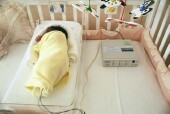 |
 |
 |

Premature Birth Linked to Some Unexpected Later Problems
Education, even income levels, appear to be affected by early birth, study finds|
|
HealthDay
Wednesday, July 16, 2008
 WEDNESDAY, July 16 (HealthDay News) -- Being born prematurely can lead to a host of long-lasting medical complications and may also affect other areas of life, such as education and income, even when no disability is apparent, a new study suggests.
WEDNESDAY, July 16 (HealthDay News) -- Being born prematurely can lead to a host of long-lasting medical complications and may also affect other areas of life, such as education and income, even when no disability is apparent, a new study suggests.
In the July 17 issue of the New England Journal of Medicine, Norwegian researchers report that babies born prematurely are more likely to have cerebral palsy, mental retardation and to need to receive disability payments.
More surprisingly, the researchers also found that when premature babies grew up, even if they had no identifiable disability, the youngest preemies were less likely to have a high income, more likely to be unemployed, more likely to receive Social Security benefits and less likely to become parents.
"The pessimistic view [of our study] is that we have demonstrated an increased risk for a broad spectrum of medical disabilities due to decreased gestational age, and for those without medical disabilities, a lesser but significant risk for a broad spectrum of social outcomes," said the study's lead author, Dr. Dag Moster, a neonatologist at the Haukeland University Hospital.
On the other hand, said Moster, "The optimistic view is that the majority of preterm survivors in our study do not have medical disabilities and seem to function very well as adults."
The study included data from more than 900,000 infants born without known birth defects between 1967 and 1983 in Norway. Of that group, 1,822 were born between 23 and 27 weeks of gestation -- 40 weeks is considered full-term. Another 2,805 were born between 28 and 30 weeks, while 7,424 were born between 31 and 33 weeks. Slightly less than 33,000 were born between 34 and 36 weeks, and the remainder were born 37 weeks or later.
For those born at term, the risk of cerebral palsy was 0.1 percent, compared to 9.1 percent for those born between 23 and 27 weeks. The risk of mental retardation was 0.4 percent for full-term babies, versus 4.4 percent for babies born between 23 and 27 weeks.
Just 1.7 percent of the full-term group received a disability pension in adulthood, compared to 10.6 percent of those who had been born between 23 and 27 weeks of gestation.
The smallest babies -- those born between 23 and 27 weeks -- who survived with no apparent medical disabilities were also 10 percent less likely to finish high school, 20 percent less likely to have completed college, 20 percent less likely to have a high income, 20 percent more likely to receive Social Security benefits and 20 percent less likely to have become parents than babies born full-term.
There was no association found between premature delivery and unemployment or criminal behavior, according to the study.
"It is important to emphasize that most premature children who survived without medical disabilities completed higher education, had good jobs and appeared to function well as adults," Moster said.
Dr. Jennifer Kloesz, a neonatologist at Children's Hospital of Pittsburgh, said the study's findings point to the need for parents to act as their child's advocate, long term.
"If you have a baby who's made it through the NICU [neonatal intensive care unit] relatively OK, you need to keep reminding your child's health-care team that your child was born prematurely and try to optimize their chances for staying on track with developmental skills. And, be sure to take advantage of whatever services schools offer for premature babies," she said.
HealthDay
Copyright (c) 2008 ScoutNews, LLC. All rights reserved.
Related News:
More News on this Date
Related MedlinePlus Pages:
| Home | Health Topics | Drugs & Supplements | Encyclopedia | Dictionary | News | Directories | Other Resources | |
| Disclaimers | Copyright | Privacy | Accessibility | Quality Guidelines U.S. National Library of Medicine, 8600 Rockville Pike, Bethesda, MD 20894 National Institutes of Health | Department of Health & Human Services |
Date last updated: 17 July 2008 |




